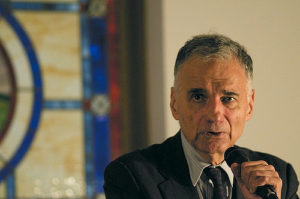Federal Judge Reveals the Shocking Truth About Our Broken Criminal Justice System
Alex Kozinski, a Reagan-appointed California judge, explains why Americans need to open their eyes and realize that the U.S. justice system is far from just. Shutterstock
Shutterstock
Shutterstock
In a piece for the Georgetown Law Review, Alex Kozinski, a Reagan-appointed California judge, explains why Americans need to open their eyes and realize that the U.S. justice system is far from just. Rather, according to Kozinski, the system “tilts heavily in favor of district attorneys, incarcerates thousands of innocent people and fails to hold accountable prosecutors who abuse their power.”
From Reason.com:
The judge’s piece challenges many of our fundamental assumptions about the justice system. It is a compelling and important read — especially as legislatures around the country wrestles with issues of prison overcrowding, police reform, changes to civil-asset forfeiture laws, police body camera bills and the like.
“Police investigators have vast discretion about what leads to pursue, which witnesses to interview, what forensic tests to conduct and countless other aspects of the investigation,” Kozinski wrote. “Police also have a unique opportunity to manufacture or destroy evidence, influence witnesses, extract confessions and otherwise direct the investigation so as to stack the deck against people they believe should be convicted.” Wow. … By the way, Kozinski is no liberal and was appointed to the court in 1985 by President Ronald Reagan. Yet he blames the nation’s incarceration rates — far higher than any other industrialized nation, and far beyond the rates in authoritarian China — on a “war on drugs” (that ramped up during the Reagan era), along with mandatory minimum sentences and three-strikes laws. …
He argues that Americans accept some truths that might not be so true: eyewitnesses are reliable, fingerprint evidence is unassailable, witness memories are reliable, prosecutors play fair, confessions are infallible, and guilty pleas always mean guilt. … The judge’s solutions fall into two categories: openness and accountability. He calls for requiring prosecutors to be more open and rigorous about, say, releasing any exculpatory evidence. He calls for video-recording interrogations, limiting the use of jailhouse informants and better vetting of expert witnesses. He also suggests creating panels that investigate claims of wrongful conviction and ones to look into allegations of prosecutorial misbehavior. He advocates eliminating “absolute prosecutorial immunity,” which currently means that prosecutors aren’t held liable even when they engage in misbehavior.
Read more.
—Posted by Natasha Hakimi Zapata
Your support matters…Independent journalism is under threat and overshadowed by heavily funded mainstream media.
You can help level the playing field. Become a member.
Your tax-deductible contribution keeps us digging beneath the headlines to give you thought-provoking, investigative reporting and analysis that unearths what's really happening- without compromise.
Give today to support our courageous, independent journalists.






You need to be a supporter to comment.
There are currently no responses to this article.
Be the first to respond.